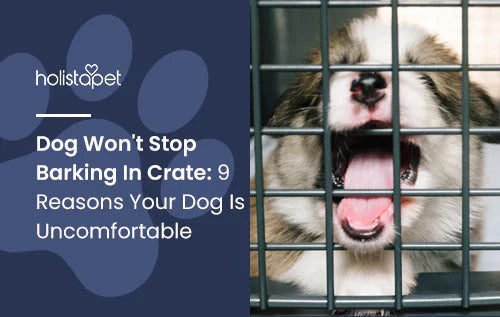If your dog won't stop barking in crate, confinement might be the problem. However, that doesn't mean you should feel guilty and ditch the crate. A crate is a great place to keep your dog when you're not around. One with adequate spacing provides your dog with safety and is perfect for several situations.
From preventing your dog from engaging in destructive behavior and helping them relax to house training to travel, a crate is an essential resource every dog owner must-have. But before you put your canine companion in a crate, there are a few things you must know that can help make their stay comfortable and stress-free. Keep reading to find out why your dog won't stop barking in the crate and what you can do to prevent this noisy issue from becoming a recurring problem.
Why Do Dogs Bark?
Dogs bark for several reasons. When and how often they bark are indicators of why they are barking. This rudimentary form of communication allows dogs to get the attention of those around them and functions in the same way as verbal communication between humans. Although dogs can't talk, their barks can give you an insight into their thoughts. Here are some common types of dog barking what they signify:
Greeting
Friendly dogs like to say hello to other people or animals by barking a few times. This type of barking is very short-lived and often accompanied by tail wagging and relaxed body language.
Social
A dog may start barking for no reason other than hearing other dogs barking. Social barking can occur when many dogs are present at the same time and place. This is especially common in neighborhoods where dogs are separated yet in the same range.
Alarm
If a dog barks at every sight and sound they hear, regardless of familiarity or context, they are alarm barking. This type of barking is common in dogs with an authoritarian personality and tense body language.
Attention
Every dog likes attention, but some dogs live for it and crave it all the time. These dogs bark at the sight of every human or animal that comes their way to satisfy their ego or get a reward, like a treat, to satisfy their never-ending yearning for attention.

Frustration
Dogs start to bark as a means to vent their frustration. Like a baby that throws a tantrum when they can't get what they want, a dog does the same when tied up, confined, and unable to roam or play.
Impulsive
A dog that's exhibits impulsive barking will often have excessively repetitive behavior. This is a common trait amongst dogs that like to pace back and forth in their yards, especially if it's next to a sidewalk or street where people often walk back and forth.
Separation
A dog may get nervous when left alone for a long period or when the owner goes away. The resulting barking is typically accompanied by other forms of distress such as depression, pacing, and destructive behaviors.
Territorial
Whether it's other dogs, animals, or people approaching their territory, a dog will start barking as a means to let the intruder know that they are not welcome. A dog's territory can be any number of places they spend a lot of time at, some of which may include their crate, home, yard, even the route they take for their daily walks.
Medical
When dogs suffer from an illness or are in pain, they bark to vocalize their affliction. This type of barking may also be accompanied by whining and obvious signs of physical trouble. Take your dog to the vet to have them examined and diagnosed for what ails them.
Dog Won't Stop Barking In Crate?
Proper crate training is essential to keep your dog safe when you're not around. A crate is useful in many scenarios, some of which include:
- Providing a secure environment for young puppies and older dogs
- Potty training with a pee pad lining the crate floor
- A form of negative reinforcement to reduce your dog's bad behavior
- Transporting your furry friend on a long trip

However, if you leave your pup in a crate for an extended period, even a minimal timeframe, they will start to bark, sometimes excessively to no end. Accompanying their barks will be other signs of distress, such as howling and whining. Although crate-trained dogs typically tolerate their stay, there are several reasons why they will start to bark. Some of these reasons include:
They Want To Get Out
Dogs like to be out and about and roam around. Being cooped up in a crate is something they're not used to, and their excessive barking may be a sign that they want out. This is the most obvious reason for their barking when housed in a crate.
Potty Break
Your dog can hold it for so long until they can't, and that's when they become noticeable with their discomfort. When nature calls, a dog will start to bark and let their owners know they want out of their crate to relieve themselves.
Boredom
Keeping a dog in a crate for an extended period will eventually make them exhausted and bored of their surroundings. They'll tend to become loud when bored and express their displeasure with barking. Consider giving your dog toys to play with to keep them occupied for longer periods or let them out for a couple hours so they can rid themselves of the doldrums, especially when keeping them in a crate overnight.
Fear
Dogs that exhibit anxious behaviors will have difficulty staying in a crate. Fear will set in, and they'll start to panic, which will lead to excessive barking, howling, and loud, distressed whining.
Genetics
Some breeds are more prone to aggressive behaviors and bark no matter the situation or surroundings. Crates can exacerbate these bouts of hostility and keep your dog angry and barking to no end.
Hunger
A growling stomach can lead to a growling dog. When hunger sets in, your dog will bark to let you know they want to eat. Feeding your dog one to two hours before you put them in a crate and giving them a few treats to snack on during their crate stay will keep them quiet.

Location
Where you decide to put your crate will be the difference between a quiet dog and a barking dog. Location is everything, so make sure you don't place the crate in places like a small room that's eerily quiet, lacks proper lighting, or in damp, enclosed areas. Garages and basements are some of the worst places to keep your dog in a crate.
Unusual Activity
Any unusual activity typically causes dogs to be alert by barking and pacing around to determine the issue. However, dogs can't pace when kept in a crate; but they can bark, and they will let people know that something strange is happening with their loud barking.
Do Dogs Get Tired of Barking?
Dogs typically don't get tired of barking and will continue to do so until they get what they want. However, their continuous barking will lead the dog to eventually become worn out and tired. A tired dog will still bark intermittently or temporarily cease it. Regardless, their urge to bark is still there, and they'll do so when they feel it's appropriate.
Why Is It Important to Stop Your Dog Barking When You Put Them In A Crate?
Several issues may arise if you can't find a way to stop your dog from barking in their crate. Excessive barking is a very stressful experience for a dog. It can become exhaustive and make them more skittish and jittery than ever before. This will cause them to become apprehensive of crates and make it hard for you to put them in one.
Excessive barking in the crate will also make you the bane of the neighborhood. Whether you live in an apartment or a house, you'll raise the ire of your neighbors, which will lead to complaints and confrontations that will make this stressful situation even worse.
Trying to stop a dog's barking doesn't have to be a frustrating experience for dog owners. Think of this as bonding time with your pup. Fixing the issue will allow you to spend time with your dog by giving them the attention they crave while at the same time helping to manage their future crate time free from excessive barking.

How to Stop Dog Barking When In A Crate
Although barking might seem like a problem that dog owners can't fix, it can with proper care, guidance, and patience. Here are some tried and true methods pet parents use to keep their faithful companions relaxed and quiet in their crates.
Provide Them With Training
The key to a successful crate stay for your dog is proper crate training. You can either hire a specialist or do it yourself. Simple tasks like praising your dog when they are quiet by giving them a yummy treat, making them desensitized to your absence by going in and out of a room, and employing the positive association method whereby you engage your dog and make them view their crate as a constructive and worthwhile space will ensure your dog will refrain from barking.
Try CBD
Cannabidiol (CBD) dog products are a great way to keep your dog calm, cool, and collected when in a crate. CBD is a naturally occurring hemp plant compound that can vitalize your dog's general wellness. Like humans and just about every mammal on Earth, dogs have an endocannabinoid system (ECS).
The ECS is an internal network of cell-signaling receptors found throughout your dog's body. It's responsible for helping to maintain balance by keeping various biological processes in check. These include mood, appetite, mobility, and rest. When your dog takes CBD regularly, they will help harmonize their wellbeing and keep them at ease during their stay in a crate. At Holistapet, we offer several CBD dog products that support your furry friend's wellness no matter the situation:
- Dog Treats: Our treats are great snacks to give to your dog. A tasty way to dose CBD, we recommend our Calming treats to help your dog during their extended crate stay. We also offer Wellness and Mobility treats for other issues your pup may have.
- Soft Chews: Our Calming soft chews are soft-baked treats that every dog will love. These heart-shaped peanut butter-flavored chews are especially good for older dogs or dogs with dental ailments.
- Oil: Giving CBD to your dog couldn't be easier or more versatile with this tincture. You can add CBD oil to your dog's drinking bowl, mix it into their food, or give it to them directly in their mouth.
- Capsules: These predosed CBD capsules contain pure CBD isolate with powerful hemp seed powder. You can feed a capsule to your pup by hiding it in their favorite soft treat or cracking one open and sprinkling the contents into their food.
Exercise
A crate can be a confining place for dogs, especially active breeds. The enclosed space of a crate can impact a dog's mood and lead to nervous behaviors, which plays a big part in their barking tendencies. But by providing your dog with enough exercise prior to isolating them inside of a crate, you'll be able to put their pent-up energy to satisfy their activity needs. In turn, you'll help your dog sleep peacefully without any nervousness in their crate.
Dog Toys & Puzzles
In addition to their physical needs, dogs also need adequate mental stimulation. As every pet parent knows, dogs love a challenge and serve to please their owners. Use this to your advantage and incorporate puzzle toys and various other mental activities with your dog's regular exercise regimen. This will wear your dog out mentally and physically, which will improve their health and keep them relaxed in their crate.
Remove Distractions
It's not rocket science: a quieter space will help keep your dog quiet. Loud music, children, outdoor views, and other triggers in the same room can cause your dog to become nervous and irritate them to the point where they want to burst out of their crate. That's why it's important to keep the crate in a quiet, well-lit room that is safe and free of distractions.
Mix Up Your Routine
Remember that dogs are all about routines. And if they don't have a proper crate routine, they'll find it hard to comply, which will result in frequent barking. Instead of putting your dog in a crate at random times, try to maintain a proper schedule. If this routine gets stale for your dog, mix it up by doing little things to calm them.
For example, you might want to stay with your dog for a little bit after you put them inside their crate. You can also put on your coat to signify that you're about to leave. Actions like this will help keep your dog's crate routine amusing and prevent it from becoming a monotonous exercise.
Don't Rush Things!
Every dog owner needs to realize that patience is key when you crate train your dog. Don't expect your canine companion to catch on immediately, as it can be a slow learning process for them. To prevent crate training from becoming a frustrating experience for you and your pup, it's important that you keep a consistent training schedule. Also, keep your surroundings in mind. Tell your neighbors what you're doing to make them understand that you're trying to solve your dog's barking issues.

When is My Dog's Barking a Problem?
Barking is not the problem; excessive barking is. If your dog can't stop barking, despite being outside of their crate, they might be suffering from a possible medical condition and be in distress. See a veterinarian immediately to determine what's causing your dog's non-stop barking. However, if your dog is just being stubborn and upset about being in their crate, you might run afoul of your neighbors and possibly violate local law.
Recent years have given rise to anti-barking ordinances in several American cities. These laws seek to limit dog barking and give residents clear guidelines on when to file a noise complaint against a neighbor who has a boisterous dog. For example, Centennial, Colorado, allows a dog to bark non-stop for 10 minutes in the day and 5 minutes at night before neighbors can file a complaint. You might live in a city where such laws exist. These laws stress how important proper crate training is and why you should commit to training your dog to be in one.
Final Thoughts - Dog Won't Stop Barking In Crate
A crate is a great option for pet parents who want to ensure their dog stays safe and secure when they're not around. In addition to providing a safe space, crates can help dog owners with several issues pertaining to their furry friends. But that doesn't mean every dog likes being in a crate. They might show their disdain by barking. However, more than just not liking their surroundings, there are several reasons why your pup won't stop barking in their crate.
By understanding the many motivations behind your dog's barking when inside of their crate, you'll be able to determine how to go about solving this noisy problem. Regardless of the causes, the first step to limit your dog's barking begins with providing them with proper crate training.
In addition, there are several tips and tricks that you can try to help make your dog's crate experience comfortable and free from excessive barking. To ease any nerves your dog may have and help them stay in a crate, you can give them some of our CBD dog products to help optimize their wellbeing and keep them calm inside and outside of this confined space.







![Probiotics For Dogs [Soft Chews] - HolistaPet](http://www.holistapet.com/cdn/shop/files/Probiotic-Infographic-1_472d7a29-e30c-435a-9638-1365d8c3a9f9.jpg?v=1725384841&width=104)




























Leave a comment
All comments are moderated before being published.
This site is protected by hCaptcha and the hCaptcha Privacy Policy and Terms of Service apply.